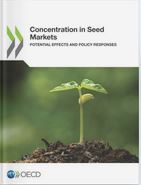 Topics Topics |
|
|
|
 Species Species |
|
|
|
|
|
Developing countries lead the way in the global adoption of biotech crops
Brussels, Belgium
7 February 2012
Globally, it is clear that since the first commercial planting in 1996, biotech crops have become an integral part of farming’s present and future, and developing countries are now leading the way. In 2011, developing countries adopted biotech crops at twice the rate of developed countries. Moreover, approximately 50 per cent of biotech crops are now grown in developing countries, the latest annual report from the International Service for the Acquisition of Agri-Biotech Applications (ISAAA) revealed today.
This news arrives as world leaders look ahead to the Rio+20 United Nations Conference on Sustainable Development in June, which aims to address the need to build a green economy, while developing sustainably and eradicating poverty. EuropaBio believes that biotech crops are clearly one tool to help farmers in both developed and developing countries to have a positive impact on the environment while also supporting the vitality of rural communities’ economies.
According to the latest report by the International Service for the Acquisition of Agri-Biotech Applications (ISAAA) in 2011, 16.7 million farmers planted 160 million hectares of biotech crops in 29 countries, up by 12 million hectares (8%) and 1.3 million farmers (8%) from 2010, when there were 15.4 million farmers planting biotech crops on 148 million hectares.
In Europe, the number of hectares of the only GM maize permitted to be cultivated here increased from 91,643 hectares to 114,607 hectares, an increase of over 20%. This included a 27% increase in Spain and a 59% increase in Portugal.
“European biotech cultivation increased this year, which shows that farmers see the benefits when they are given the choice to plant these crops. However, Europe simply isn’t keeping pace with its global competitors, who have now been growing a wide array of biotech crops for 17 years. What message are we sending to the rest of the world when high-tech jobs are leaving the EU and anti-biotech scare tactics continue to be business as usual?,” commented Carel du Marchie Sarvaas, EuropaBio’s Director for Green Biotechnology Europe.
- Farmers in developing countries earn over €1 billion per year from planting biotech crops.
- Over 90% of farmers who plant biotech crops are small, resourcepoor farmers.
- Planting biotech crops can reduce fuel use and CO2 emissions because low- and no-till methods can be utilised. In 2011, the equivalent of 9 million cars’ CO2 emissions were eliminated thanks to biotech crops.
- In the EU biotech crops were grown in 8 countries in 2011: Spain, Portugal, the Czech Republic, Germany, Slovakia, Romania, Poland and Sweden.
- Only two biotech crops are currently authorized for cultivation in the EU: an insect-resistant maize and a potato for industrial use.
- 22 biotech crops are currently awaiting authorization for cultivation in the EU, including maize, soybean, potato and sugarbeet. Biotech crops have been grown on more than 1 billion hectares worldwide since the mid-1990s.
Additional Resources
More news from: EuropaBio
Website: http://www.europabio.org Published: February 8, 2012 |
|
|
|
Better Food Venture's
AgTech Landscape 2019

|
| |
|
2019 THRIVE Top 50
landscape map

|
| |
|
Concentration in Seed Markets - Potential Effects and Policy Responses

(OECD December 2018)
|
|
Visualizing Consolidation
in the Global Seed Industry
1996–2018

Seed Industry Structure
1996-2018
Phil Howard
Associate Professor
Michigan State University
|
|
2017 Seed Company Family Tree
Ccreated Septebmer 2017
by Robert Walsh
WaSoo Farm, Elk Point, South Dakota |
 |
Syngenta Brands Family Tree
Ccreated January 2017 by Robert Walsh, WaSoo Farm, Elk Point, South Dakota
|
 |
| |
Rabobank's
World Vegetable Map 2018 |
 |
|
|